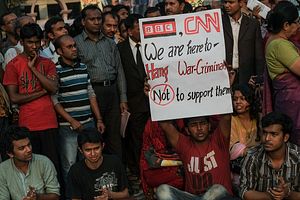Another top Islamist leader, Motiur Rahman Nizami, was sentenced to death by Bangladesh’s Supreme Court (SC) after losing his final appeal to review his death sentence. He was executed shortly after midnight on May 11, sparking protests from the opposition and criticism from human rights groups.
Nizami, formerly the head of Jammat-e-Islami, the country’s largest Islamist party, was convicted of war crimes committed during the 1971 Bangladesh Liberation War after a 2014 trial. He was hanged at a Dhaka prison after he refused to seek clemency from President Abdul Hamid against his death sentence.
Just before the execution, Nizami’s final appeal was denied. The four-member Appellate Division bench, led by Chief Justice Surendra Kumar Sinha, read out the final verdict on the second day after the bench finished hearing Nizami’s petition.
“Dismissed,” said the judge of the apex court upon reading out the verdict. Unlike in trial courts, the SC procedures did not require Nizami’s presence during the delivery of the judgment.
Immediately after the verdict was read, Jamaat-e-Islami issued a statement saying that Nizami was a “victim of state-sponsored conspiracy.”
“The government has taken a plan to kill Maulana Nizami in the name of trial of crimes against humanity as part of its political vengeance,” the statement said.
Nizami is the fourth Jamaat leader and fifth opposition leader hanged in recent years. In his trial, he was found guilty on 16 charges, including genocide, rape, and torture during the independence war.
The country’s supreme court is convicting Jamaat-e-Islami and opposition politicians for war crimes one by one. Salauddin Quader Chowdhury of Bangladesh’s main opposition BNP and Jamaat’s secretary general Ali Ahsan Mohammad Mujahid were also executed last year for crimes against humanity. Their requests for clemency were rejected by President Abdul Hamid.
The spate of execution cases are a response to the 2010 war crimes tribunal set up by the Prime Minister Sheikh Hasina to investigate the abuses during the 1971 Liberation War. Jamaat-e-Islami was opposed to Bangladesh’s secession from Pakistan and sided with the Pakistani military to orchestrate atrocities during the Liberation War. During that time, Nizami was the chief of the party’s student wing as well as the leader of the al-Badr militia force, manned by Jamaat activists. He was also a minister in the past BNP-led four-party alliance government, with his party being its crucial ally.
The ruling party, the Awami League, has said that the executions are necessary to heal the wounds of the nine-month war.
But critics think that the government is merely using the tribunal to target political opponents. Human rights groups such as Human Rights Watch (HRW) previously said the court’s procedures fall short of international standards and lack global oversight.
After Nizami’s execution, the government is now turning its attention to Jamaat-e-Islami’s key financier: Mir Quasem Ali. Mir Quasem has already lost an appeal against his death sentence; his only option is to seek presidential clemency. If his request is denied, he will follow Nizami to the gallows.
Roshni Kapur is an independent journalist based in Singapore.

































